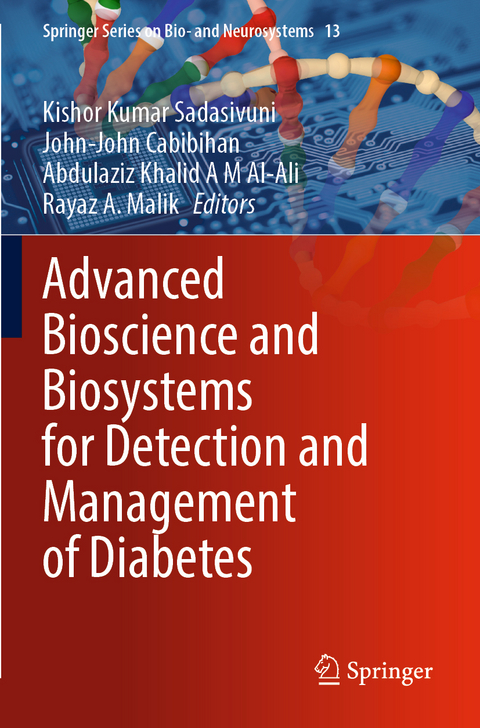
Advanced Bioscience and Biosystems for Detection and Management of Diabetes
Springer International Publishing (Verlag)
978-3-030-99730-4 (ISBN)
lt;p>Dr. Kishor Kumar Sadasivuni is a Research Assistant Professor and the group leader of Smart Nano Solutions at Center for Advanced Materials, Qatar University. He received his Ph.D. in Materials Science and Engineering from the University of South Brittany at Lorient, France, in 2012.
John-John Cabibihan (Senior Member, IEEE) received the Ph.D. degree in bioengineering, with a specialization in biorobotics, from Scuola Superiore Sant'Anna, Pisa, Italy, in 2007. From 2008 to 2013, he was an Assistant Professor with the Electrical and Computer Engineering Department, National University of Singapore. He is currently an Associate Professor with the Department of Mechanical and Industrial Engineering, Qatar University.
Abdulaziz Al-Ali received the Ph.D. degree in machine learning from the University of Miami, FL, USA, in 2016. He is currently an Assistant Professor with the Computer Science and Engineering Department, College of Engineering, Qatar University. In addition to developing novel machine learning techniques, his research involves building predictive models for textual, image, and sensor-based data. Dr. Al-Ali's interest remains to be in the machine learning, artificial intelligence, and data mining fields. He now takes the role of the Director of the KINDI Center for Computing Research in Qatar University.
Introduction.- Review of Emerging Approaches Utilizing Alternative Physiological Human Body Fluids in Non- or Minimally Invasive Glucose Monitoring.- Current Status of Non-invasive Diabetics Monitoring.- A New Solution for Non-invasive Glucose Measurement Based on Heart Rate Variability.- Optics Based Techniques for Monitoring Diabetics.- SPR Assisted Diabetics Detection.- Infrared and Raman Spectroscopy Assisted Diagnosis of Diabetics.- Photoacoustic Spectroscopy Mediated Non-Invasive Detection of Diabetics.- Electrical Bioimpedance Based Estimation of Diabetics.- Millimeter and Microwave Sensing Technique for Diagnosis of Diabetics.- Different Machine Learning Algorithm involved in Glucose Monitoring to Prevent Diabetes Complications and Enhanced Diabetes Mellitus Management.- The role of Artificial Intelligence in Diabetes management.- Artificial Intelligence and Machine learning for Diabetes Decision Support.- Commercial Non-Invasive Glucose Sensor Devices for Monitoring Diabetics.- Future Developments in Invasive and Non-Invasive Diabetics Monitoring.
| Erscheinungsdatum | 04.07.2023 |
|---|---|
| Reihe/Serie | Springer Series on Bio- and Neurosystems |
| Zusatzinfo | VIII, 313 p. 150 illus., 148 illus. in color. |
| Verlagsort | Cham |
| Sprache | englisch |
| Maße | 155 x 235 mm |
| Gewicht | 492 g |
| Themenwelt | Informatik ► Theorie / Studium ► Künstliche Intelligenz / Robotik |
| Medizin / Pharmazie ► Physiotherapie / Ergotherapie ► Orthopädie | |
| Technik | |
| Schlagworte | Artificial Intelligence • Diabetics Mellitus Detection • invasive • machine learning • Management • non-invasive |
| ISBN-10 | 3-030-99730-8 / 3030997308 |
| ISBN-13 | 978-3-030-99730-4 / 9783030997304 |
| Zustand | Neuware |
| Haben Sie eine Frage zum Produkt? |
aus dem Bereich


